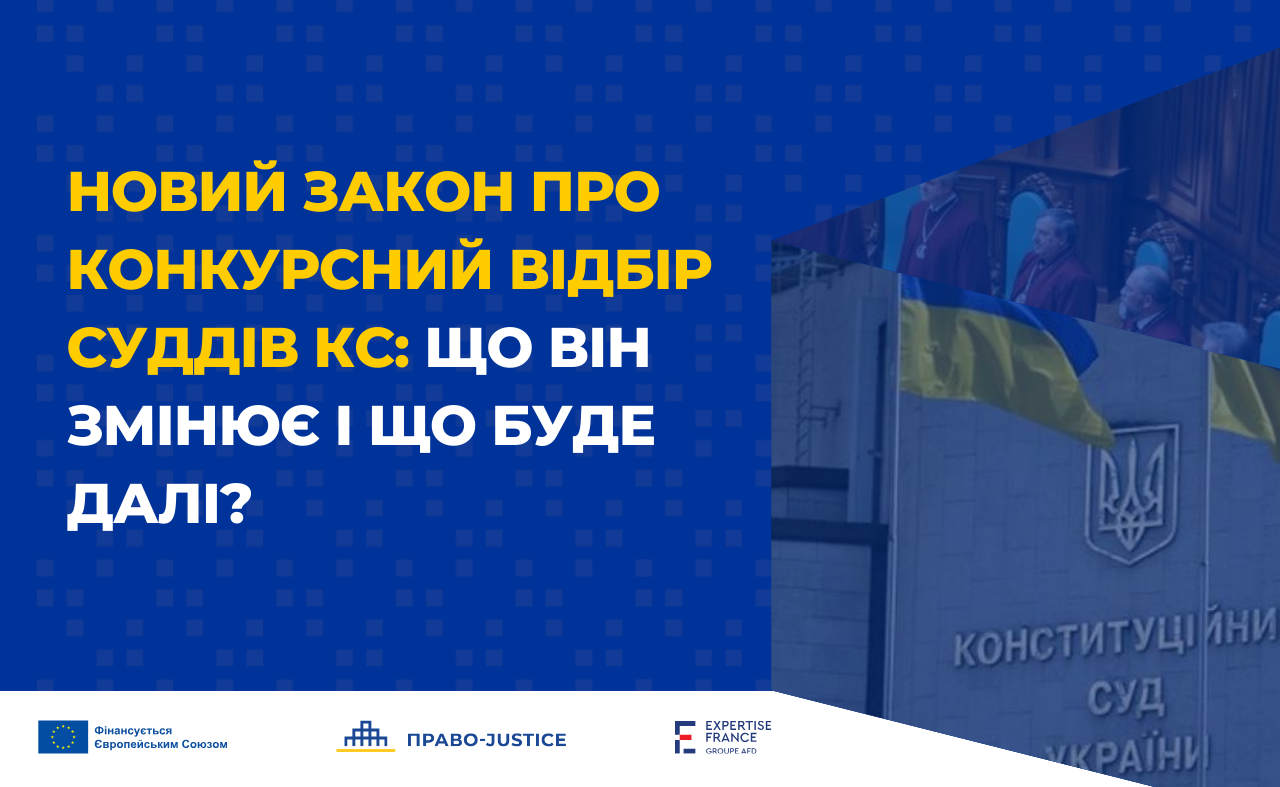New law on competitive selection of Constitutional Court justices: What does it change and what comes next?

On 20 August, Law of Ukraine No. 3277-IX came into force, clarifying the provisions on the competitive selection of candidate justices of the Constitutional Court of Ukraine (CCU). Thus, Ukraine has fulfilled one of the key recommendations of the European Commission to maintain its candidate status in the EU – the first on the list of 7 EU candidates.
The CCU consists of 18 judges. Six judges are appointed by the President, the Parliament and the Congress of Judges. It should be noted that currently 5 positions in the CCU remain vacant, namely: 3 under the quota of the Parliament and 2 under the quota of the Congress of Judges. Therefore, the new law will make it possible to fill the vacant positions under the new procedure. Can it be called revolutionary? What will happen next?
Before answering this question, let’s take a brief look at the events preceding the adoption of the law in its current version.
It is known that on 23 June 2022, Ukraine obtained EU candidate status, but with certain conditions. According to the decision of the European Council, in order to start full-fledged accession negotiations, Ukraine must first fulfil the so-called “seven steps”. The adoption and implementation of legislation on the selection procedure for Constitutional Court of Ukraine justices, including a pre-selection process based on the assessment of their integrity and professional skills in line with the recommendations of the Venice Commission, was the first requirement on this list.
In response to the European Commission’s recommendation, MPs rather quickly, namely in August 2022, registered the respective draft law in the Parliament. As Law No. 2846-IX, the document came into force in December 2022. However, on 25 January 2023, the Venice Commission reported that it did not reflect two of its main recommendations, namely the mechanism for eliminating the possibility of blocking decision-making and the composition of the Advisory Group of Experts (AGE), as well as the AGE’s authority to vet CCU candidate justices.
For example, the first recommendation suggested that the mechanism for resolving deadlocks should be exercised by an AGE consisting of 7 members, with 4 appointed through an international quota or by using the casting vote of international experts during the 6-year transition period, should the AGE still consist of 6 members.
The second recommendation was that the Law itself should guarantee that the candidates recognised as “ineligible” by the AGE on the basis of either morals or professional competence should be excluded from any further competition. Furthermore, the assessments by the AGE were to be made available to the public. Responding to the criticism, on 25 May 2023, MPs registered draft law No. 9322 aimed at aligning Law No. 2846-IX with the recommendations of the Venice Commission. The document stipulated that during the transition period, the AGE would take all decisions by at least 4 votes of its members, of which at least 2 votes would be by members appointed under the international quota. Moreover, it confirmed that if a CCU candidate justice receives a negative opinion from the AGE, s/he will be considered to have failed the respective stage of the competitive selection.
After the first reading, the Venice Commission issued an additional opinion on the new draft law. It stated that draft law No. 9322 complied with the key recommendations, although the Venice Commission further recommended some additional amendments, in particular as regards challenging the decision of the AGE. After that, on 27 July, the document on clarifying the provisions on the competitive selection of CCU candidate justices was adopted in the second reading and in its entirety, and on 20 August, the law came into force.
This event is of great importance for Ukraine’s European integration as the law introduces a completely new procedure for selecting Constitutional Court justices in line with the recommendations of the Venice Commission.
It is expected that there will be fewer grounds for complaints about “questionable appointments” to the Constitutional Court, and transparent procedures will motivate lawyers with impeccable reputation to apply for the vacancies. The competition will be held with the support of a specially established Advisory Group of Experts. It will assess CCU candidate justices’ moral qualities and competence in the field of law.
During the transitional period, the AGE will consist of 6 experts: one person will be appointed by the President, the Verkhovna Rada and the Council of Judges (instead of the Congress of Judges), as well as the Cabinet of Ministers on the proposal of the Venice Commission; two more members will be delegated by international organisations that have been providing technical assistance to Ukraine in the field of constitutional reform and the rule of law for a long time.
Competitions for vacant positions in the Constitutional Court will start in the near future pursuant to the new procedure. The law allocates a bit over a month to form the AGE. Also, within a month, the Parliament and the Council of Judges are to announce the beginning of accepting documents from CCU candidate justices. After the information about the candidates is submitted to the AGE, it will have about five months to assess whether the candidates meet the criteria of high moral qualities and recognised legal competence. Therefore, its first achievements can only be summed up in six months.
We are confident that in the long run, the mechanism adopted for selecting CCU justices will have a positive impact on the quality of decisions rendered by the constitutional body, which, in turn, will contribute to increased public confidence in the judiciary.
The text was first published in the regular blog by EU Project “Pravo-Justice” at LB.ua.